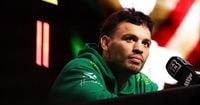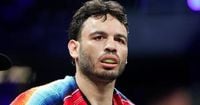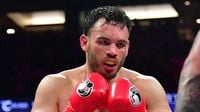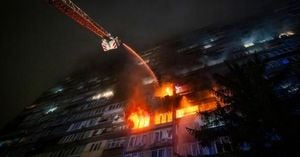Boxing’s storied legacy took a dramatic and unexpected turn this week as Julio César Chávez Jr., once hailed as Mexican boxing royalty, found himself at the center of a legal and personal storm that has made headlines on both sides of the border. Chávez Jr., the 39-year-old son of legendary champion Julio César Chávez Sr., was deported from the United States to Mexico on or before August 19, 2025, and immediately taken into custody by Mexican authorities in the northern state of Sonora. He is currently being held in a federal maximum-security prison in Hermosillo, facing grave allegations that have shaken the boxing community and cast a shadow over his once-promising career.
The saga began in early July when U.S. Immigration and Customs Enforcement (ICE) agents arrested Chávez Jr. outside his Studio City, California home. The arrest came just four days after his unanimous decision loss to YouTuber-turned-boxer Jake Paul in Anaheim, a fight that was supposed to mark his comeback but instead became a prelude to legal chaos. According to the Department of Homeland Security, Chávez had overstayed a tourist visa that expired in February 2024 and submitted fraudulent statements in his application for permanent residency, which he filed on April 2, 2024, based on marriage to a U.S. citizen. U.S. authorities labeled him an “egregious public safety threat,” yet, in a twist that puzzled many, he was allowed to reenter the country from Tijuana into San Diego on January 4, 2025, despite an active Mexican arrest warrant.
Mexican authorities wasted no time acting on that warrant. The investigation into Chávez Jr. began in 2019, led by Mexico’s attorney general Alejandro Gertz Manero, and culminated in a 2023 warrant for his arrest. The charges are severe: alleged involvement in organized crime, arms and drug trafficking, and ties to the notorious Sinaloa Cartel, which U.S. officials have designated a foreign terrorist organization. Upon his deportation, Chávez was immediately admitted to a maximum-security prison in Hermosillo, Sonora, according to officials who spoke to The Associated Press on condition of anonymity.
Mexican President Claudia Sheinbaum confirmed the deportation at her morning press conference on August 19, 2025. "I understand he was deported," Sheinbaum told reporters. "I don’t know if it was yesterday or this morning, but we were informed that he was arriving in Mexico." Her comments echoed the uncertainty and gravity surrounding the case, as details of the charges and the extent of Chávez’s alleged cartel connections continue to emerge.
Chávez Jr.’s fall from grace has been as public as it has been tumultuous. Once the WBC middleweight world champion, a title he won in 2011 and defended three times, he shared the ring with greats like Canelo Álvarez and Sergio Martinez, though he lost to both. His career, however, has been marred by a series of personal and legal struggles. He has battled drug and alcohol addiction, failed drug tests, missed weight egregiously, and faced criticism for his intermittent dedication to the sport. In 2012, he was convicted of drunken driving in Los Angeles and sentenced to 13 days in jail and 36 months probation. In January 2024, he was arrested again in Los Angeles for possession of two AR-style ghost rifles, a case that remains pending as he reports his progress in a court-ordered mental health diversion program.
The story of Chávez Jr. is also a story of legacy and expectation. His father, Julio César Chávez Sr., is widely regarded as Mexico’s greatest boxer—a national icon whose career in the 1980s and 1990s saw him mix with celebrities and, at times, with figures from the criminal underworld. The elder Chávez supported his troubled son through thick and thin, yet has not commented publicly since the latest wave of legal troubles. The shadow of his father’s fame, coupled with the pressures of living up to an almost mythic reputation, has loomed large over Chávez Jr.’s career and personal life.
The younger Chávez’s connections to the Sinaloa Cartel, as alleged by both U.S. and Mexican authorities, have added a new and dangerous dimension to his already checkered past. Law enforcement officials claim that the four-year investigation unearthed ties to cartel figures, including Ovidio Guzmán, the son of infamous drug lord Joaquín “El Chapo” Guzmán. Chávez’s U.S. permanent residency application was further complicated by his marriage to a U.S. citizen reportedly connected to the cartel through a prior relationship with the now-deceased son of El Chapo. These revelations have fueled speculation and debate about the extent of Chávez’s involvement in organized crime and the reach of cartel influence into sports and celebrity circles.
Chávez’s recent loss to Jake Paul on June 28, 2025, was itself a moment of disappointment for boxing purists. The former champion was reluctant to engage for much of the contest, and though he found some late-round success, many felt he lacked the intent to win. The defeat, combined with his ongoing legal woes, has left his boxing future in limbo. His attorney, Michael Goldstein, remains hopeful: “I’m confident that the issues in Mexico will be cleared up, and he’ll be able to continue with his mental health diversion” in California, Goldstein told the Los Angeles Times.
Yet the legal hurdles are significant. The charges Chávez faces in Mexico—organized crime, arms trafficking, and alleged cartel affiliation—carry the potential for lengthy incarceration if proven. Meanwhile, questions linger about how he was able to travel freely between the U.S. and Mexico despite active warrants and public safety concerns. The Department of Homeland Security’s decision not to prioritize his immigration enforcement has drawn criticism and raised broader questions about the intersection of celebrity, law enforcement, and international crime.
As Chávez Jr. sits in a Hermosillo prison cell, the boxing world is left to reflect on the perils of fame, the weight of legacy, and the unpredictable turns that life outside the ring can take. For now, the former champion’s fate remains uncertain, his story a cautionary tale that continues to unfold with every new revelation. The spotlight, once reserved for his exploits in the ring, now shines on a very different stage—one defined by legal battles, personal demons, and the enduring complexities of the Chávez name.
With investigations ongoing and the world watching, all eyes remain on Sonora, where one of boxing’s most recognizable names faces the fight of his life—this time, outside the ropes.






